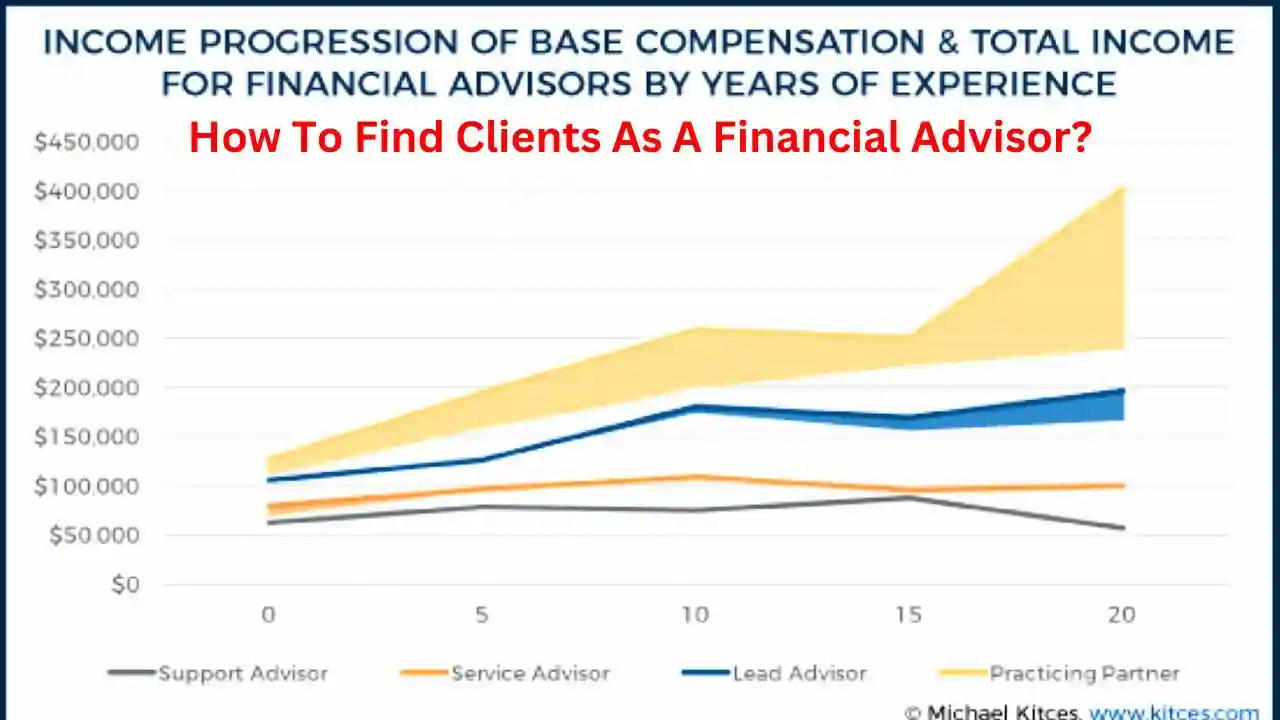For Regular Latest Updates Please Follow Us On Our WhatsApp Channel Click Here
Last updated on October 7th, 2024 at 02:21 am
Building a client base as a financial advisor requires a strategic approach that combines relationship-building, marketing, and expertise.
For Regular Latest Updates Please Follow Us On Our WhatsApp Channel Click Here
Here are some effective strategies to understand how to find clients as a financial advisor:
Networking and Relationship Building: [How To Find Clients As A Financial Advisor In 2024]
Leverage Your Existing Network:
Reach out to friends, family, and former colleagues.
Attend Industry Events:
Connect with potential clients and other professionals at financial conferences and seminars.
Join Community Organizations:
Volunteer and participate in local events to build relationships.
Referrals: [How To Find Clients As A Financial Advisor In 2024]
Encourage satisfied clients to refer you to their friends, family & contacts.

Digital Marketing: [How To Find Clients As A Financial Advisor In 2024]
Build a Strong Online Presence:
Create a professional website and have it optimized for search engines (SEO).
Utilize Social Media:
Share valuable content, engage with your audience, and build trust.
Content Marketing:
Produce informative articles, blog posts, or videos to attract potential clients.
Email Marketing:
Nurture leads and stay connected with your audience through email campaigns.
Niche Down: [How To Find Clients As A Financial Advisor In 2024]
Identify Your Target Market:
Focus on a specific demographic or client type to tailor your services.
Develop Expertise:
Become a trusted authority in your chosen niche/sector.
Build Relationships:
Network with professionals in your target market.

Client Acquisition Strategies: [How To Find Clients As A Financial Advisor In 2024]
Cold Outreach:
Proactively reach out to potential clients through phone calls, emails, or social media.
Paid Advertising:
Consider using platforms like Google Ads or social media advertising to generate leads.
Partnerships:
Collaborate with other professionals, such as accountants or lawyers, to cross-promote services.
Free Consultations:
Offer initial consultations to demonstrate your expertise and build rapport.
[Also Read: LLMs In Fintech: The Huge Potential 2024]
Additional Tips:
Provide Exceptional Service:
Deliver value to your clients and exceed their expectations.
Focus on Client Retention:
Build long-term relationships with your clients.
Continuous Learning:
Stay updated on financial trends and industry best practices.
Measure Your Success:
Track your marketing efforts and adjust your strategy accordingly.
Remember: Building a successful financial advisory practice takes time and effort. Consistency, patience, and a client-centric approach are essential for long-term success.
Frequently Asked Questions (FAQs) On Financial Advisor / Investment Advisor Answered Here:
How to become a Financial Advisor without a Finance Degree?
Becoming a Financial Advisor Without any Finance Degree
While a finance degree can be beneficial, it’s not a strict requirement to become a financial advisor.
Many successful advisors come from diverse backgrounds. Here’s a roadmap to get you started:
Build a Strong Foundation:
Financial Literacy: Develop a deep understanding of personal finance, investing, taxes, insurance, and retirement planning.
Industry Knowledge: Stay updated on market trends, economic indicators, and regulatory changes.
Soft Skills: Cultivate strong communication, interpersonal, and problem-solving skills.
Obtain Necessary Licenses:
Series 6 or 7: These licenses authorize you to sell securities.
Series 63 or 65: These licenses cover the Uniform Securities Agent State Law Examination (Series 63) or the Uniform Investment Adviser Law Examination (Series 65).
State-Specific Licenses: Depending on your city/location, you could need additional licenses.
Gain Experience:
Entry-Level Positions: Consider roles in customer service, sales, or administrative positions within financial firms.
Internships: Seek internships at financial advisory firms to gain practical experience.
Mentorship: Find a mentor in the industry to properly guide your career path.
Continuous Learning:
Certifications: Consider certifications like Certified Financial Planner (CFP), Chartered Financial Analyst (CFA), or Certified Public Accountant (CPA) to enhance your credibility.
Online Courses: Utilize online platforms to learn about investment strategies, financial planning, and market analysis.
Industry Events: Attend conferences and seminars of the industry to stay updated on the latest industry updates & trends.
Build Your Network:
Networking: Connect with other financial professionals, potential clients, and industry experts.
Online Presence: Create your own professional website and social media profiles to display/showcase your expertise.
Specialize:
Niche Market: Consider specializing in a specific area, such as retirement planning, estate planning, or wealth management.
Remember: Building a successful career as a financial advisor takes time and dedication. Focus on providing exceptional value to your clients, and your reputation will naturally grow.
How do you become a Registered Investment Advisor?
Becoming a Registered Investment Advisor (RIA) in the US involves several key steps:
Meet the Educational and Licensing Requirements:
Series 65 Exam: This is the most common exam for becoming an investment advisor representative (IAR), the individual who works for an RIA. However, some states accept other combinations of exams (like Series 7 and Series 66).
State-Specific Requirements: Some states have additional licensing or registration requirements.
Consider Additional Certifications: While not mandatory, certifications like Certified Financial Planner (CFP), Chartered Financial Analyst (CFA), or Certified Public Accountant (CPA) can enhance your credibility.
Form a Business Entity:
Choose a Business Structure: Decide on the structure of your RIA (sole proprietorship, partnership, LLC, corporation).
Register Your Business: Obtain necessary licenses and permits for your business.
Develop a Business Plan:
Define Your Target Market: Identify the clients you want to serve.
Outline Services: Determine the investment services you will offer.
Set Fee Structure: Decide on your compensation model (fee-only, commission-based, or hybrid).
Create a Marketing Plan: Develop strategies to attract clients.
Register with the SEC or State:
SEC Registration: Required for RIAs with assets under management (AUM) exceeding $100 million (or in some cases, lower thresholds).
State Registration: Required for RIAs with AUM below the SEC threshold or those with specific state requirements.
Form ADV: Complete this comprehensive registration form that discloses information about your business, services, fees, and conflicts of interest.
Establish Compliance Procedures:
Create Policies and Procedures: Develop internal guidelines for handling client information, investments, and conflicts of interest.
Implement Recordkeeping: Maintain detailed records of client transactions, communications, and investment advice.
Obtain Necessary Insurance:
Professional Liability Insurance: Protects your business from all kind of claims of errors or omissions.
Other Coverages: Consider additional insurance like cyber liability or property insurance.
Build Your Client Base:
Network: Develop relationships with potential clients and industry professionals.
Marketing: Utilize your marketing plan to attract clients.
Provide Exceptional Service: Build trust and referrals through excellent client service.
Important Considerations:
Fiduciary Duty: RIAs are held to of a fiduciary standard, meaning they must professionally act in the best interest of their clients.
Compliance: Adherence to regulatory requirements is crucial.
Ongoing Education: Stay updated on the latest industry trends, updates and the latest regulatory changes.
Remember: Becoming an RIA is a complex process. It’s advisable to consult with legal and financial professionals to ensure compliance and navigate the regulatory landscape effectively.
Additional Resources:
For Regular Latest Updates Please Follow Us On Our WhatsApp Channel Click Here